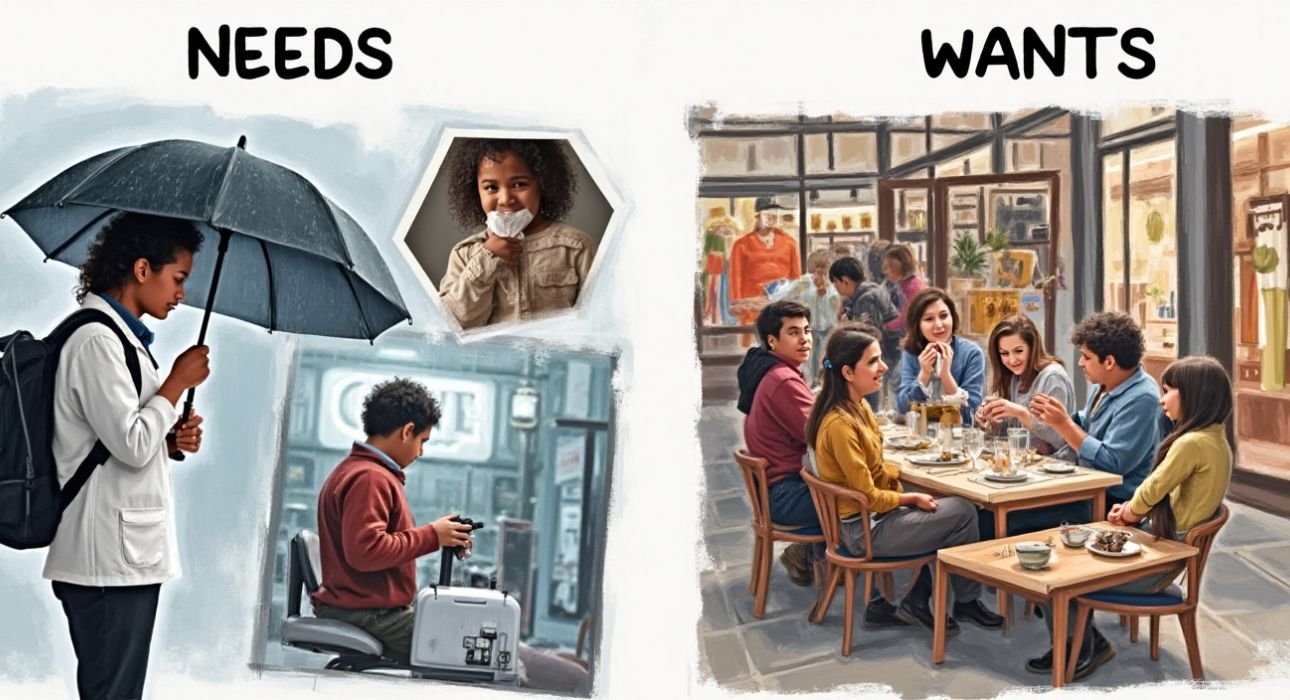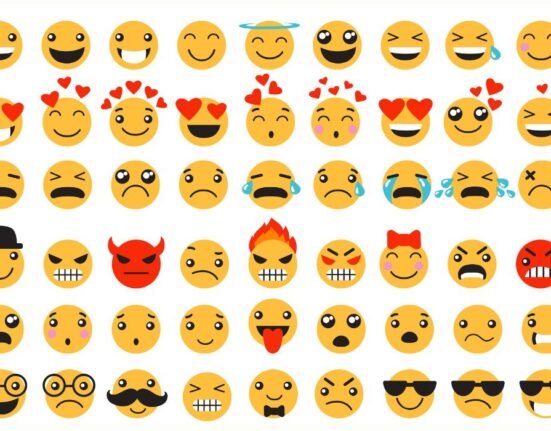Each human has innate drives. Some of these are rooted in survival, and others are in emotional wants and social pressures. But what if those inner drives get crossed, causing us to conflate what we want with what we require? This crisis, while frequently labelled as an economic or pragmatic challenge, is deeply psychological. It’s an expression of how we relate to ourselves—our sense of self, feelings, values, and vulnerabilities.
Read More: Why People Settle in a Relationship: The Psychology of Comfort vs Fulfillment
What exactly does one mean by Needs and wants?
On the surface, needs are things we NEED to live: food, water, safety, shelter. Wants are things we WANT to make our lives better: a new cell phone, a designer handbag, a trip to Europe. From a psychological perspective, though, the line is not always so clean-cut.
Our system operates on more than just biological requirements. Following the fulfilment of fundamental physiological and safety needs, as seen in Maslow’s Hierarchy of Needs, human beings yearn for love, belonging, self-esteem, and ultimately self-actualisation. These are needs, too—psychological needs, growth needs, emotional needs—albeit ones not related to food or shelter.
Here is where the lines get crossed. When one purchases fashionable attire to be accepted by others or luxury to feel worthy or esteemed, they might not necessarily be satisfying a shallow desire, but instead filling a psychological deficiency that is not being met. This is a paradox: what appears to be a desire could in fact be born out of an emotional emptiness that the individual is unconsciously attempting to fill.
Read More: What happens in your brain when you’re in love?
The Emotional Basis for Wants
Psychologists are in accord that much of our “wants” stem from underlying emotions. For instance:
- Desire to control: In ambiguous settings, individuals might shop on impulse or accumulate material possessions since buying gives the illusion of control.
- Loneliness or rejection: Individuals will spend money on socialising or on brand products to feel part of a group or more “included.
- Low self-esteem: The need for validation can be expressed through spending on status-improving things-cars, gadgets, and designer clothing.
Here, a want is no longer simply a desire for a product—it is an effort to self-comfort, to manage, or to symbolically “repair” something within.
Read More: How To Deal with Rejection? Insights from Expert
Cognitive Dissonance: The Battle Within
One of the most prevalent psychological conflicts we have is cognitive dissonance—the discomfort that results from having two conflicting values or beliefs. For instance:
“I want to save money.”
“But I also want to purchase that pricey handbag.”
This internal conflict creates stress. People resolve it either by justifying the purchase (“I deserve it; I’ve had a tough week”), minimising the importance of saving (“I’ll save next month”), or rationalising with self-deception (“This is actually an investment”).

Such explanations demonstrate just how powerful the allure of psychological needs can be. When needs, such as the need for emotional well-being or success, are misdiagnosed as physical desires, the brain creates some pretty clever shortcuts to make the want appear as a need. These can eventually warp self-knowledge and decision-making.
Read More: A Psychology-backed Guide to Decision-Making
The Role of Conditioning and Social Comparison
Since early childhood, we’re conditioned by our surroundings. If love and admiration were given when we reached a milestone or appeared a certain way, then we might grow up thinking that external praise is linked to self-worth. This conditioning is fertile ground for the blurring of wants and needs.
Social comparison theory is also a big one. We tend to measure our happiness, success, and self by comparing ourselves to others. In a world where everyone presents their best life online, we’re bombarded with what others possess and are doing. This creates a feeling of inadequacy and us compelled towards wants that just seem necessary in order to “keep up.”
Read More: Social Comparison Theory
Wants as Emotional Substitutes
Wants function as emotional substitutes. A new device may temporarily divert from sorrow. An expensive dinner may dampen the pangs of loneliness. Such consumption is emotional and frequently impulsive. This phenomenon is often termed as emotional spending or retail therapy, when buying is used to regulate or manage emotions.
Although it may provide a temporary high, the behaviour ultimately tends to form a pattern of avoidance, wherein actual emotional needs are neglected for fleeting pleasure. This is comparable to the way individuals utilise food, alcohol, or social media as coping strategies—innocuous in small doses, but bad when they’re used to bypass emotional processing.
Self-Awareness: The Solution to Confusion
The solution to the paradox of needs versus wants is self-awareness. Taking a moment, pausing and reflecting while asking yourself, “What feeling am I attempting to resolve with this want?” can eventually lead to the discovery of the emotional motivation for our wants. The Following are some reflective questions that assist in distinguishing between a psychological need and a want:
- “Is this something I can live without, or is it essential to my well-being?”
- “Am I attempting to fill a void or repair a feeling?”
- “Would I still desire this if nobody else knew I possessed it?”
- “What emotion led to this desire, stress, jealousy, boredom, sadness?”
Over time, practising such emotional introspection strengthens emotional intelligence, allowing us to respond more thoughtfully to our internal states rather than react impulsively.
Read More: Jealousy and Envy: Difference of feelings
Rebalancing: Satisfying Needs Without Neglecting Joy
It’s important to remember that wants are not inherently bad. Seeking joy, comfort, or aesthetics is part of the human experience. The problem arises only when these wants take precedence over needs or when they mask deeper issues. A balanced psychological mindset is key. It is permissible to spend money on things that are pleasurable, as long as they’re not being used as a means of escaping emotional reality. The intention isn’t deprivation, but choice. Some useful habits include:
- Mindful spending: Monitor not only what you’re spending money on, but why.
- Emotional journaling: Learn the patterns behind your wants.
- Digital detox: Cut back on exposure to triggers for social comparison.
- Therapy or self-work: Recognise unsatisfied emotional needs and seek out more constructive ways to meet them.
Read More: 7 Subtle Signs your Relationship is stealing your Peace of Mind, According to Psychology
Conclusion: A Psychological Reframing
The need vs wants dilemma is not just a financial issue; it’s an entry point into the human psyche. All of our decisions—what to buy, pursue, or prioritise are predicated on how we feel about ourselves and the world around us. When our emotional needs are not expressed, they manifest as material desires.
But by being emotionally present, aware of our inner drives, and conscious in our choices, we can free ourselves from compulsive craving and return to what truly animates us mentally, emotionally, and spiritually. Ultimately, understanding what you really require is the start of becoming who you really are.
FAQs
1. What is the difference between needs and wants?
Needs are essential for survival and psychological well-being, such as food, water, shelter, safety, love, and self-esteem. Wants are non-essential desires that enhance comfort or pleasure, like branded clothes or luxury gadgets. However, the psychological lines often blur when emotional needs drive our wants.
2. Why do we sometimes confuse wants with needs?
Because emotional or psychological voids—like low self-esteem, loneliness, or a need for validation—can disguise themselves as material desires. For example, wanting a designer bag might be an attempt to feel worthy or accepted.
3. How does cognitive dissonance affect our spending decisions?
Cognitive dissonance is the mental discomfort of holding two conflicting beliefs. For instance, wanting to save money while also desiring an expensive item can create internal tension. To resolve it, we often rationalise the purchase (“I deserve it”), even if it’s against our better judgment.
4. What emotional factors influence our wants?
Some key emotional drivers include:
- A desire for control in uncertain times
- Feelings of exclusion or loneliness
- Low self-worth or insecurity
These emotional states lead people to seek comfort or validation through material consumption.
5. Is it wrong to fulfil wants?
Not at all. Wants are natural and part of being human. Problems arise only when:
- Wants to override essential needs
- Spending is used to avoid emotional issues
- There is a lack of awareness about why the want exists
6. What are some ways to distinguish a want from a need?
Try reflecting with these questions:
- “Would I still want this if no one knew I had it?”
- “Is this helping me feel better emotionally—or am I avoiding something deeper?”
- “Is this essential to my well-being or temporary gratification?”
7. How can I become more aware of my emotional spending habits?
Start with:
- Mindful spending: Track not just what you buy, but why.
- Emotional journaling: Record feelings that trigger spending.
- Therapy or coaching: Seek support in identifying emotional patterns.
- Digital detox: Reduce exposure to social comparison triggers.
8. What is “retail therapy”, and is it harmful?
Retail therapy is shopping to manage emotions. While it can offer temporary relief, when used repeatedly, it may lead to avoidance of deeper emotional needs, similar to overeating or overusing social media.
References +
1. Maslow, A. H. (1943) – A Theory of Human Motivation
Introduced Maslow’s Hierarchy of Needs—physiological, safety, love, esteem, and self-actualisation.
2. Festinger, L. (1957) – A Theory of Cognitive Dissonance
Describes the discomfort we experience when our beliefs and actions are inconsistent. 3. Baumeister, R. F. (1991) – Meanings of Life
Explores how human needs and desires are deeply linked with self-worth and societal roles. 4. Schor, J. (1998) – The Overspent American: Why We Want What We Don’t Need. Examines consumerism and the emotional motivations behind spending habits. 5. Dittmar, H. (2008) – Consumer Culture, Identity and Well-being
A psychological look at how material goods relate to emotional and identity-related needs. 6. Tesser, A. (1988) – Toward a self-evaluation maintenance model of social behaviour. Discusses how social comparison affects self-perception and behaviour. 7. Kasser, T. (2002) – The High Price of Materialism
Argues that materialism can negatively impact emotional well-being and relationships.













Leave feedback about this